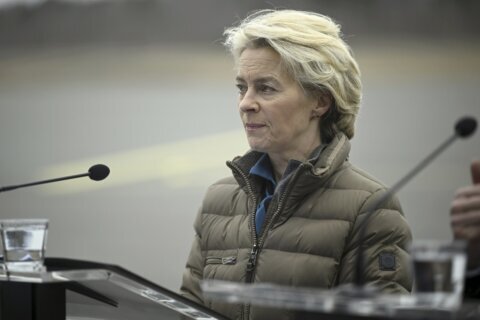LONDON (AP) — British Prime Minister Boris Johnson’s government is facing allegations of favoritism and corruption amid a backlash from lawmakers and the public over efforts to rewrite lobbying rules and shield a member of Johnson’s party from censure.
The Conservative Party lawmaker at the center of the dispute resigned Thursday after the government was forced to shelve plans to overhaul the disciplinary process for members of Parliament and block his suspension. Owen Paterson, a former Cabinet minister, insisted he was “totally innocent” but couldn’t defend himself under the current system.
But the angry argument raged on, threatening to dent the integrity of the House of Commons, the democratically elected chamber of the British Parliament.
“This has been an unbelievable 24 hours even by this government’s chaotic standards,” Keir Starmer. leader of the opposition Labour Party, said after Paterson’s resignation. “Only yesterday Boris Johnson was forcing his MPs to rip up the rules on standards in public life in a truly damning indictment of this prime minister and the corrupt government he leads.”
Starmer argued that Johnson “must now apologize to the entire country for this grubby attempt to cover up for the misdemeanor of his friend.”
The furious dispute came after lawmakers voted Wednesday not to suspend Paterson after he was found to have broken lobbying rules. Following the vote, it seemed Paterson was set to avoid the 30-day suspension recommended by the House of Commons’ standards committee.
It was the first time in decades that lawmakers hadn’t accepted the standards committee’s decisions. Opposition parties responded with fury and threatened to boycott future standards actions.
The lobbying episode is the latest to fuel allegations that Johnson and his government don’t follow rules that apply to everyone else. Home Secretary Priti Patel was allowed to keep her job after she was found to have bullied members of staff. Johnson himself has been criticized for allowing a Conservative Party donor to fund renovations of the prime minister’s residence.
Jonathan Evans, a former director of Britain’s domestic intelligence service who now leads the government’s Committee on Standards in Public Life, criticized the government’s handling of the Paterson case as “deeply flawed.”
Attempting to rewrite the rules to protect an individual member of parliament was a “retrograde step” that threatens Britain’s reputation for good governance, Evans said in a speech Thursday.
“It’s not inherent in the nature of the country that we will not be corrupt,” he said. “We could slip into being a corrupt country, and that’s why we need to be vigilant around these issues. It’s also quite possible that we could slip in terms of international perceptions of us.”
Newspaper headlines reflected the anger, with the Daily Mail proclaiming that “Shameless MPs Slink Back Into Sleaze,’’ and the Guardian saying that “PM Accused of Corruption as Rules on Sleaze Torn Up.”
By Thursday morning, the government was changing course. House of Commons Leader Jacob Rees-Mogg said he would look for cross-party consensus on overhauling the disciplinary process and that the link between the Paterson case and the future system for lawmakers must be severed.
“I fear last night’s debate conflated an individual case with the general concern,’’ Rees-Mogg said. “This link needs to be broken.’′
Parliamentary Commissioner for Standards Kathryn Stone said last month that Paterson lobbied the government in 2016 and 2017 on behalf of two companies that were paying him — the clinical diagnostics company Randox and the meat-processing firm Lynn’s Country Foods.
The Commons Standards Committee said Paterson’s actions were an “egregious case of paid advocacy.” It recommended that he be suspended from the House of Commons for 30 sitting days.
But Paterson, a former environment minister who has been a member of Parliament since 1997, called the investigation “biased” and wanted to appeal. He said he hadn’t been allowed to present his own evidence and that anxiety about the probe played a part in the death of his wife Rose, who killed herself in 2020.
With integrity of disciplinary procedures in the House of Commons being called into question, Paterson said it was time to leave politics.
“I maintain that I am totally innocent of what I have been accused of and I acted at all times in the interests of public health and safety,″ Paterson said in a statement. “I, my family and those closest to me know the same. I am unable to clear my name under the current system.″
Copyright © 2024 The Associated Press. All rights reserved. This material may not be published, broadcast, written or redistributed.







